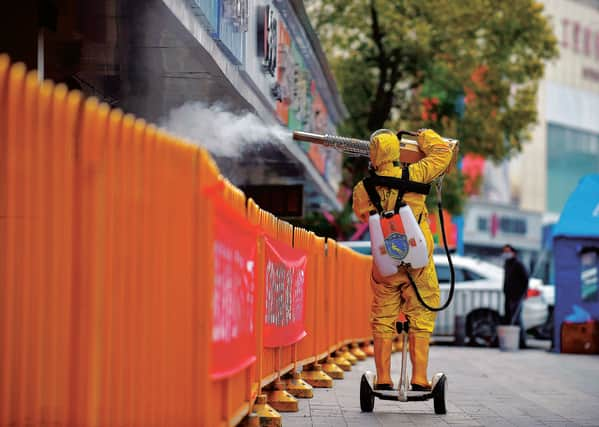Bill Jamieson: Lengthy lockdown will cause havoc if we squash sombrero


Not only are football fixtures suspended but an international tourism event which may have helped limit the coronavirus impact on the sector has also been cancelled. VisitScotland’s Expo event scheduled in Aberdeen in the opening days of April has been called off. More than 2,000 people had been expected to attend from about 30 countries.
Such restrictions are now increasingly evident. So is there any good news? In China’s Wuhan province the number of newly reported cases has dropped. Across 26 other provinces there are similar reports of decline. And reports from Beijing suggest a city gradually coming back to life.
Advertisement
Hide AdAdvertisement
Hide AdSuch signs of recovery are bound to be seized upon as we struggle with a pandemic that has resulted in an economic killer-blow. Businesses and households are in despair that the virus may have some ten to 14 weeks to run before it peaks.
Prime Minister Boris Johnston points to a dramatic graph of the imminent peak of the epidemic, declaring that the government is intent on flattening “the sombrero” with a phased roll-out of measures, pushing a lower peak incidence out for two or three months.
But many in business would prefer the sombrero. Others suggest our best hope lies in “herd immunity”, providing a measure of protection for individuals who are not immune. Chains of infection would be disrupted, stopping or slowing the spread of disease.
Meanwhile, public reaction to the government’s measured response has been sceptical. Thousands of companies and organisations have voluntarily adopted more stringent precautions.
Such an everyday behavioural shock is almost without precedent in modern times – and will re-write economic history. Forecasts of GDP growth have ceased to have meaning. A recession now looks inescapable as thousands of businesses, from airlines to restaurants, leisure firms to retailers, travel companies to financial services, face a struggle for survival. It’s the duration of this pandemic as much as the depth that has alarmed the business world.
Coronavirus is set to spark substantial levels of financial distress among both businesses and households, potentially cascading into the banking sector. This poses formidable challenges for policy-makers – not least for the European Central Bank where president Christine Lagarde has refused, unlike her predecessor, to fire any financial “bazookas” and has set her face against action to reduce government bond yield spreads between Germany, Italy and other Eurozone countries.
Financial vulnerabilities were evident in the corporate sector in many economies even before the virus struck, with rising debt and declining credit quality. Consumer-facing sectors especially at risk from the impact of the virus tend to have weaker financial positions.
In all this, the UK government has been hit amidships. Last Wednesday Chancellor Rishi Sunak unveiled a £12 billion package of measures to combat the impact of the epidemic. This, together with the £18bn of extra day-to-day spending also promised was described as a fiscal “stimulus”.
Advertisement
Hide AdAdvertisement
Hide AdBut now comes a blizzard of restrictions intended to curb the transmission of the virus – from the prohibition of public gatherings to advice on self-isolation – that cannot but have the most adverse impact on economic activity: the opposite of stimulus.
Yesterday Finance Minister Kate Forbes announced a £320m package of support for Scottish businesses to mitigate the worst effects of the pandemic.
These included 75 per cent rates relief for the retail, hospitality and leisure sectors with a rateable value of less than £69,000 from 1 April; an £80 million fund to provide grants of at least £3,000 to small businesses; and a fixed rates relief of up to £5,000 for all pubs with a rateable value of less than £100,000.
Meanwhile, a helpline providing businesses with advice and guidance on Covid-19 has been announced by Economy Secretary Fiona Hyslop. This will be open Monday to Friday, between 8.30am to 5.30pm. Advisers across Scotland will answer questions from businesses related to the epidemic.
What of the longer-term impact of the pandemic on business and the economy? For many companies in the services sector, business and revenue will have been permanently lost. Their survival will depend on loan interest reductions by banks and tax relief measures by HMRC.
But by the late summer of this year we should start to see a rebound in activity. How we work is likely to change – with much more reliance on the internet, resort to cloud computing and video conferencing.
Permanent working from home will increase – though many will welcome the opportunity to return to offices. Work is, after all, a highly social activity and we need interaction with colleagues to stimulate innovation and adaptation.
Internet shopping – particularly ordering food and groceries online – will also enjoy a big boost.
Advertisement
Hide AdAdvertisement
Hide AdAccording to Scottish teacher Chloe Sandilands, who has been living in Beijing since last September, early signs of a return to normality have been helped by the mass adoption of technology to meet shopping needs. “People are able to use a single payment app – such as Alipay or WeChat,” she writes, “not only to arrange deliveries, but also to order taxis and for online banking.
“The same apps also provide daily updates on coronavirus recovery figures. China is so far ahead of the UK in terms of technology and convenience.” She says the country’s convenience culture has helped overcome social distancing and that panic buying has been largely avoided.
Life has to go on. “People still wear masks but I think people are getting less scared. You see more people out and about which is nice. It feels like it’s coming back to life.”
Hope at the end of the line – while we still await the worst of this pandemic , a return to “normal” can’t come soon enough.
Comments
Want to join the conversation? Please or to comment on this article.